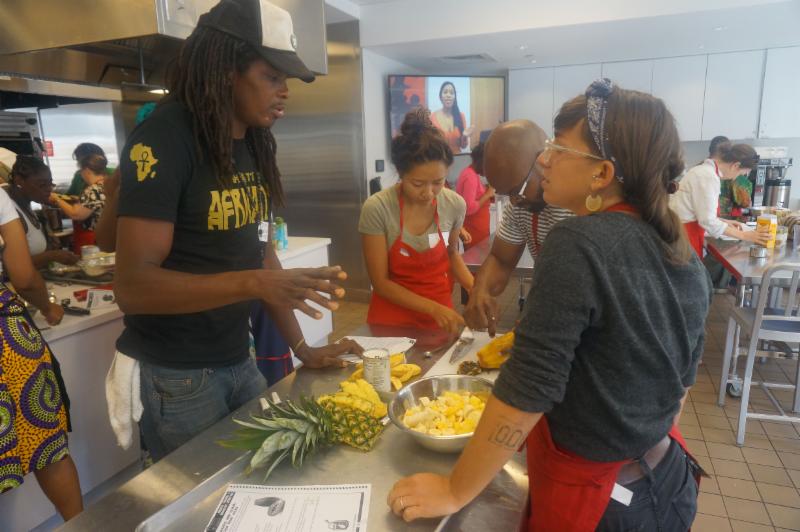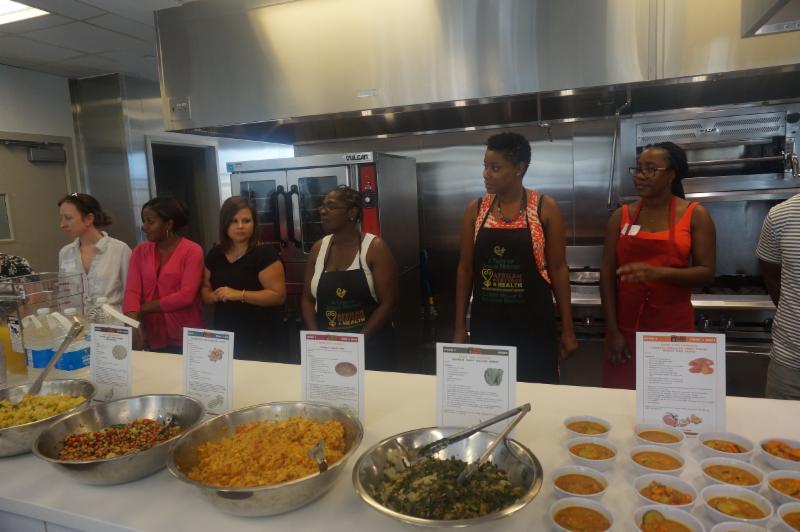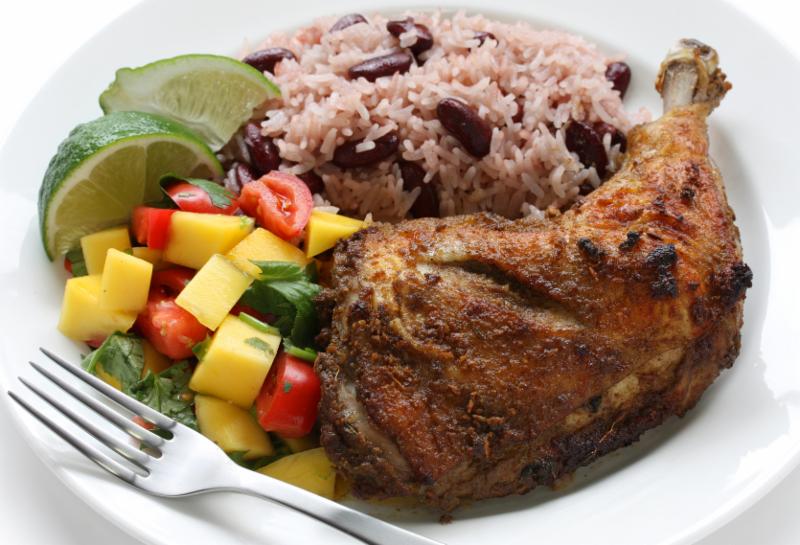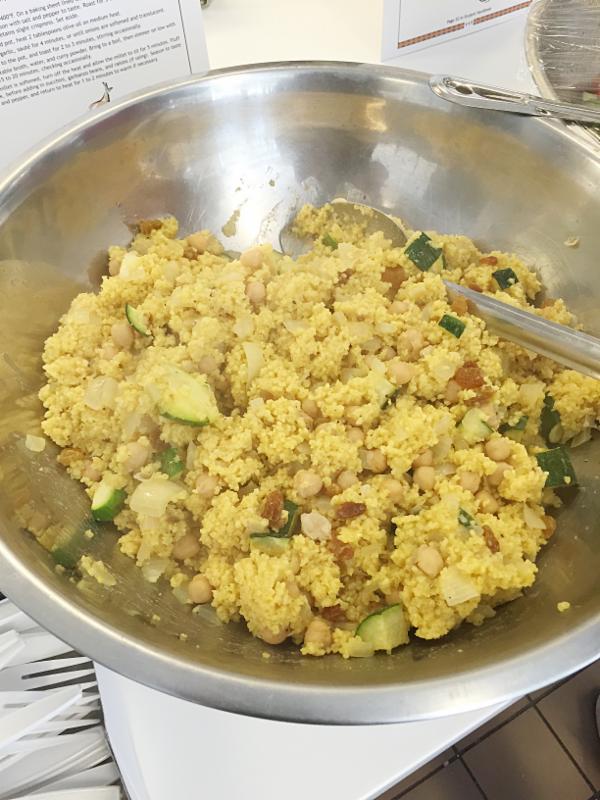| |
|
A Quarterly Newsletter Fall
2016
|
|
Fall Greetings from Oldways!
|
ATOAH Update
Our First "Train the Trainer" Seminar
Oldways hosted its first
Train the Trainer
Seminar on September 9, 2016 in Philadelphia. It was a true success featuring presentations, cooking demonstrations, a lot of conversations and networking. Dejenaba Gordon, one of our star ATOAH Ambassadors, led an engaging PowerPoint presentation on the ATOAH curriculum and best teaching practices for 25 enthusiastic attendees from various institutions and organizations across Philadelphia. Graciously, the
Central Branch of the Free Library of Philadelphia Culinary Literacy Center hosted us once again! It was wonderful to share additional information about ATOAH as well as to make recipes from the ATOAH curriculum and engage in meaningful dialogue in the library's beautiful commercial kitchen! We thank everyone at the Culinary Literacy Center, Dejenaba, and all of our attendees! We look forward to sharing more "Train the Trainer "seminars nationwide in the future! Want to see more?
Check out additional photos from our training on our ATOAH Facebook Page!
 
Paperwork Goes Digital to Help You
For all those who haven't heard . . . we have officially gone DIGITAL with all our class paperwork! Now you are able to submit all of your teacher evaluations, student surveys, and student metrics online! We of course will continue to offer paper copies of each form to anyone who requests them when signing up to host a class series.
We hope that you find this exciting addition most helpful! For anyone with outstanding paperwork we hope this inspires you to submit your forms as soon as you can! We really appreciate it!
Please find the digital forms here. O
nce on this page you will find all the subsequent forms in the toolbar on the left-hand side of the page.
Online Class Site Directory
We also wanted to let everyone know about our new "Class Site Directory on our website! You can find a state-by-state database of potential class sites here, which we will update periodically.
We hope this resource aids you in bringing A Taste of African Heritage to your community!
Please let us know if you have any questions or concerns.
We thank you all for your continued support and participation in A Taste of African Heritage community cooking series. We could not do it without you!
|
AHH Health Study:
Urban Versus Rural Living
In each newsletter issue, we share one scientific study that reinforces the importance of the African Heritage Diet and of eating more like the old ways.
 |
|
 |
Photo courtesy of compassion.com
|
A study conducted by the University of Botswana found
that weight, socio-economic status, and snack patterns are directly related to where one resides. Specifically, those who reside in the country's urban areas eat more snack foods and fewer traditional foods than those who reside in the country's rural areas. The study suggests that as folks migrate to urban areas, it is important for them to keep consuming fruits, vegetables and traditional foods in order to maintain a healthy weight.
This is commonly the case in the U.S. as well. In order
to maintain both a healthy weight and overall good health, it is important to increase consumption of real/whole foods as much as possible.
Do your research to find food sources available in your area! Community farmers markets are becoming more commonplace around the nation, many-mom-and-pop corner stores have partnered with healthy food initiatives to sell fresh fruits, vegetables, and whole foods, in addition to other food sources you may not traditionally think of. Take advantage of everything around you!
|
The Chef's Corner
We are pleased to spotlight a contemporary chef who is working to bring greater awareness of the rich culinary traditions of the African Diaspora.
If you are looking for a Gullah Geechee culinary ambassador - someone who both lives and studies Gullah Geechee foodways - search no further than
Chef Benjamin "BJ" Dennis
. Dennis grew up in Charleston, South Carolina, but his grandparents kept him in touch with the old ways of the Sea Islands. We caught up with him recently to talk about how his heritage has played a fundamental role in shaping his career as a chef as well as how it connects him personally to the African Diaspora.
|
T
he Spice Rack
Spices and herbs are key to building flavor and
reducing the amount of sodium needed to season our food. This decreases incidents of high blood pressure. In this
issue, we take a closer look at ALLSPICE.
The name allspice is a little bit misleading. This fresh dried berry native to the Americas is not a combination of spices, but rather derives its name from its complex aroma - some say it is reminiscent of clove, cinnamon, and nutmeg. Allspice has been used in the past to treat a variety of ailments, including indigestion, high blood pressure, and toothaches, as well as in the manufacture of toothpaste, cosmetics, and deodorants. Currently, Jamaica is the main producer of allspice, where it is also known as
pimenta
. The spice is a signature flavor, along with the Scotch bonnet pepper, in Jamaican jerk, a national dish that originated in Maroon communities. Jerk consists of meat (most commonly pork, chicken, or goat) marinated with either a spicy wet or dry rub that is then traditionally smoked (but now is sometimes grilled for convenience). The name "jerk" comes from the technique of jerking (poking the meat with holes so that it may absorb flavor), as well as from the Spanish word,
charqui
, for jerky. You'll find allspice used in pickling and in sausage-making.
|
What We're Reading . . .
|
|
|
Photo Courtesy of the Smithsonian National Museum of African American History & Culture
|
The grand opening of the
Smithsonian National Museum of African American History & Culture took place September 24, 2016
. A contingent from the Oldways African Heritage & Health Program attended
, and we've been reading everything about this incredibly important historical institution and moment. If you are as curious as we are about what it took to make the dream of this museum a reality, and the various obstacles along the way faced by the Museum's Founding Director, Dr. Lonnie Bunch, read
The Definitive Story
. If you'd like to salivate over the menu at the Museum's restaurant, Sweet Home Café, check out this recent Washington Post article.
In continuing to learn about African Diasporic traditions, we've been reading about the roots and persistence of black agrarianism
in America. Africans brought to this country successfully passed on to their descendants both their agricultural expertise and their respect for the connection between nature and spirituality. Currently, many black land owners, including those in the Gullah Geechee community, are fighting to hold on to their land as they draw from these sustaining traditions. To read more, go to the Food First website.
Any books, blogs, or articles that you'd like to share with us? We'd love for you to post on our
Facebook page or email us so that we may include in the next issue of our newsletter
.
|
 African Heritage Dine-Around-Town
African Heritage Dine-Around-Town
Oldways knows that one of the easiest ways to dine out healthfully is to choose cultural restaurants that serve traditional world cuisines. Whether African, Caribbean, Indian, or Japanese, cultural restaurants tend to offer the widest variety of vegetables, beans, whole grains, meats, and spices prepared in deliciously dynamic ways.
Every newsletter edition, we put the spotlight on three African heritage restaurants from our
Dine-Around-Town
list, describing the traditional features of their menus and perhaps inspiring you to t
ry
making some of these cultural dishes at home. This season
we
are
featuring New England restaurants and chefs
.

Cape Neddick, Maine
Co-owners Bill Allen, Donovan Murray, and Sparrow Wilson brought a taste of the Caribbean to Maine when they opened the Jamaican Jerk Center outside of the beach town of Ogunquit. You can find all the classics here, including jerk pork and chicken, fried plantains,
ackee
and
saltfish
(salt cod served with a Jamaican fruit similar in consistency to scrambled eggs), beef and chicken patties, along with rotating specials such
as oxtail
and goat.
Charlestown, Massachusetts
Samad Naamad, chef, owner, and filmmaker offers a Moroccan-French menu along with belly-dancing at this Boston-area brasserie. Try the seven-vegetable
couscous
or one of the menu's five tagines (traditional Moroccan stews that share their name with the conical clay cooking pot in which they are prepared).
Amherst, Massachusetts
Chef Chichi Pat Ononibaku serves up her native Nigerian food reminiscent of her childhood memories. She recommends you try her signature curry tomato sauce ("Nigerian stew"); you'll also find foo foo (pounded yam), egusi soup (a melon seed-thickened soup) and ATOAH favorites like
akara (black-eyed pea fritters) and jollof rice.
|
Oldways African Heritage Recipes
The most powerful call to action to improve the health of African American families and communities is to get cooking! To help families put the
African Heritage Diet Pyramid on their plate, here are three delicious, healthy recipes that take their cues from African roots.
Click on the title below to go to the Oldways recipe.
 |
Millet is a staple of continental African cuisine: it's easy to digest and rich in nutrients. In this recipe, we added sautéed zucchini for a bit of crispness, curry powder for a hint of spice, chickpeas for added protein, and golden raisins for a delightful sweetness.
|

|
Yams and collards combine with teff, herbs, and spices, creating a beautiful mosaic pattern in this robust grain loaf. Serve as a side dish or as a vegetarian main dish. If you cannot find yams, you may substitute sweet potatoes.
|

|
With fall upon us you can enjoy this Moroccan-spiced pea soup that is light and cozy. Enjoy as a starter to your meal or main course with salad and fresh whole grain bread.
Recipe and photo courtesy of
Heart to Plate
food blog
|
|
 |
|
The work of the African Heritage and Health Program would not be possible without the generous support of the Walmart Foundation.
|
|
|
|
| |
|